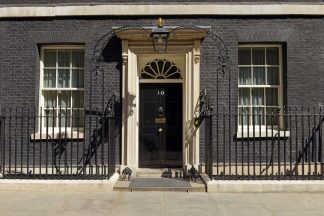The UK Government has announced it will fight the Scottish Government in court to defend its decision to veto gender reforms passed by Holyrood.
Alister Jack became the first Scottish secretary in history to use a Section 35 order when he blocked the Scottish Parliament’s Gender Recognition Reform Bill.
The Scottish Government is attempting to have the decision overturned by the courts after labelling the move an “attack” on Holyrood.
But the UK Government on Thursday said it will “robustly defend” its decision to veto the bill, saying it could have had an “adverse” impact on UK-wide equalities law.
 STV News
STV NewsIt is understood the Advocate General for Scotland informed the Court of Session on Thursday that the UK Government would contest the petition for judicial review, which was filed by the Scottish Government last month, and the UK Government is said to be prepared to set out its arguments in the case soon.
A spokesperson said: “The UK Government will robustly defend the secretary of state’s decision to prevent the Scottish Government’s Gender Recognition Reform Bill from becoming law.
“We are clear that the proposed legislation would have an adverse effect on reserved matters, including on the operation of the law as it applies to Great Britain-wide equalities protections.”
A Scottish Government spokesperson said: “This reference is now before the court, therefore it would not be appropriate to comment on live legal proceedings.”
Scotland’s First Minister announced on April 12 that he would launch a major court battle against the UK Government over the issue.
Humza Yousaf had described the move by Westminster as an “undemocratic veto”.
In December, the Scottish Parliament passed the Gender Recognition Reform Bill with cross-party, majority support.
 Scottish Parliament
Scottish ParliamentAnnouncing the move, the Scottish social justice secretary insisted a court battle is the “only reasonable means of resolving” the conflict.
Shirley-Anne Somerville said: “The use of Section 35 is an unprecedented challenge to the Scottish Parliament’s ability to legislate on clearly devolved matters and it risks setting a dangerous constitutional precedent.”
She added: “The UK Government gave no advance warning of their use of the power, and neither did they ask for any amendments to the bill throughout its nine-month passage through Parliament.
“Our offers to work with the UK Government on potential changes to the bill have been refused outright by the secretary of state, so legal challenge is our only reasonable means of resolving this situation.
“It is important to have clarity on the interpretation and scope of the Section 35 power and its impact on devolution.
“These matters should be legally tested in the courts.”
Speaking on Thursday, Scottish Tory MSP Rachael Hamilton said Westminster had “no option” but to issue a Section 35 order.
She said: “Rather than redraft a flawed bill – that puts the safety of women and girls at risk – Humza Yousaf has opted to ignore the views of the majority of Scots, who are opposed to it, and embark on another unwanted and unnecessary court case.
“It’s a nakedly transparent attempt to manufacture grievance with the UK government to try to divert attention from the civil war and scandal engulfing the SNP.”
 iStock
iStockThe Gender Recognition Reform Bill aims to make it quicker and easier for transgender people to change their legally recognised gender.
But some women’s rights campaigners raised concerns about the impact the legislation would have on single-sex spaces for females.
Under the reforms, the age limit for applications for a gender recognition certificate would be lowered from 18 to 16.
A requirement for a medical report, including a diagnosis of gender dysphoria, would also be dropped.
Follow STV News on WhatsApp
Scan the QR code on your mobile device for all the latest news from around the country




























